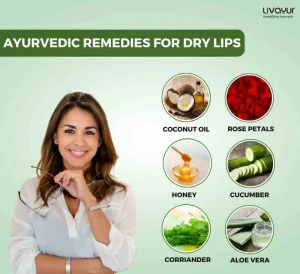This article is reviewed by an expert

Are you experiencing dry, cracked, or uncomfortable lips? Wondering what might be causing these symptoms?
If yes, then keep reading. In this article, learn everything you need to know about cheilitis or chapped lips.
What Is Cheilitis (1)?
Cheilitis, commonly known as chapped lips, is a condition that affects the delicate and sensitive skin on your lips. It mainly occurs because your lips lack oil glands, making them more susceptible to dryness and irritation. This condition may however be further exacerbated by factors like harsh weather, prolonged sun exposure, etc.
Signs & Symptoms of Cheilitis (1)
One of the primary symptoms of cheilitis is dryness and scaling of the lips. The skin on the lips may become parched, leading to a rough and flaky texture. Cracking of the skin is another common sign, causing discomfort and potential pain. In addition, peeling of the lips can occur, exacerbating the dryness and making them appear unsightly.
Itching is another telltale symptom of cheilitis, often accompanying dryness and scaling. This persistent urge to scratch the lips can further worsen the condition and contribute to potential irritation. Mild pain may also be experienced, particularly when the lips crack or become too dry.
Furthermore, cheilitis can manifest as sores on the lips and in the mouth. These sores can be uncomfortable and may make eating or speaking challenging.
Causes of Cheilitis (1)
Chelitis can occur due to various factors, ranging from environmental conditions to underlying medical issues. Each type of cheilitis may also have a different cause. However, some of the common causes of cheilitis include:
- Excessive Sun Exposure: Sunburn can not only affect our skin but also lead to dryness and discomfort on our lips.
- Harsh Weather Conditions: Cold weather, as well as extremely hot and dry climates, can also contribute to the loss of moisture from our lips, leaving them prone to chapping.
- Frequent Licking of Lips: It may seem like a temporary solution for dryness, but the enzymes in saliva can break down the delicate skin on the lips and lead to further dryness and irritation.
- Underlying Health Problems: Certain medical conditions, such as allergies, thyroid disorders, and autoimmune disorders, can also cause cheilitis.
- Medications: Some medications may cause an adverse reaction and result in chapped lips.
- Nutrient Deficiency: A deficiency in essential vitamins like iron and vitamin B can also contribute to cheilitis. These nutrients play a vital role in maintaining healthy skin, including the skin on our lips.
- Dehydration: Dehydration impacts the moisture levels in our body, consequently affecting the hydration of our lips and causing cheilitis.
Types of Cheilitis (1)
Some common types of cheilitis and their respective causes are:
- Actinic Cheilitis: This type is caused by frequent sun exposure, leading to inflammation and damage to the lips.
- Angular Cheilitis: It is characterised by a fungal infection at the corners of the mouth, often triggered by factors such as moisture build-up.
- Contact Cheilitis: This type occurs as an allergic reaction, typically in response to contact with certain substances or allergens.
- Drug-Induced Cheilitis: It occurs as a reaction to a medication, particularly retinoids, leading to lip inflammation and discomfort.
- Eczematous Cheilitis: Flare-ups of this type are associated with underlying eczema, resulting in redness, dryness, and itching of the lips.
- Infective Cheilitis: Viral or bacterial infections, such as herpes simplex, can cause inflammation and sores on the lips.
- Glandular Cheilitis: This type is characterised by the thickening of the salivary glands, leading to lip swelling and discomfort.
Diagnosis of Cheilitis (1)
Diagnosing chapped lips, or cheilitis, is typically done through a visual examination of the lips and the surrounding skin. The healthcare provider observes the signs and symptoms of cheilitis and inquires about any recent exposure, such as sunburn or extreme weather conditions. No additional tests are usually required for identifying the condition.
Treatment of Cheilitis (1)

You can treat cheilitis easily at home with simple remedies. However, it is recommended to consult a doctor if the condition persists or worsens, as in some cases, medications or the help of a dermatologist might be required.
Some home remedies or tips to treat and prevent cheilitis at home are:
- Drink an adequate amount of water throughout the day to maintain hydration.
- Use lip balm or ointment as needed to moisturise and protect your lips.
- Apply lip balm with sunscreen when spending time outdoors to protect your lips from harmful UV rays.
- Avoid licking, picking, or biting at your lips as this can further irritate and worsen the condition.
- Keep foreign objects away from your mouth, such as pens, jewellery, or metal objects, as they can introduce further irritation or injury to your lips.
- Use a humidifier to add moisture to the air and prevent dryness, especially during colder months or in dry climates.
Cheilitis Treatment In Ayurveda
Ayurvedic treatment of chelitis offers a safe and effective alternative to limited conventional treatments that only address symptoms. In fact, chelitis is described in traditional texts as Vataja prakopa ostha, which presents with pain, dryness and cracking in the area. Ayurvedic treatments and therapies described as viable for chelitis relief include the following 2:
- Swedana: Ayurvedic sudation therapy that involves applying warm oil or ghee on the lips and then covering them with a cloth soaked in hot water or herbal decoction. This helps to moisturize and heal the lips.
- Pratisarana: Pratisarana for chelitis involves applying a paste of Callicarpa macrophylla, triphala, Symplocos racemosa and honey on the lips. This helps to cleanse, heal and nourish the lips.
- Topical Treatments At Home: Ingredients like honey, coconut oil and aloe gel may also be used as home treatments as they promote healing due to antiinflammatory, antifungal and moisturizing effects 3,4.
On a Final Note
Cheilitis, or chapped lips, is a common condition that can cause discomfort and affect the appearance of your lips. Understanding the causes, symptoms, and types of cheilitis can help a great deal in taking appropriate steps to prevent and treat it effectively.
Remember that while home remedies are often sufficient to treat cheilitis, it is recommended to consult a doctor if your condition persists or worsens. In some cases, medications or the expertise of a dermatologist may be required for proper management of cheilitis.
FAQs (1)
- How do lip balm and ointment help treat cheilitis?
Lip balm seals cracks in the lips, while ointment keeps them hydrated for longer. Therefore, it is recommended to apply lip balm or ointment as needed throughout the day.
- What should I do if my chapped lips bleed?
Bleeding occurs when cracks in the lips turn into cuts or sores. If you have any lip-specific ointment at home, try using it. However, if bleeding persists or worsens, seek medical advice for advanced treatment options.
- How long does it take for cheilitis to heal?
On average, cheilitis takes two to three weeks to heal completely. Regularly applying lip balm can help ease discomfort and expedite the healing process.
- What can happen if cheilitis is left untreated?
Untreated cheilitis can lead to bleeding, pain, and stinging. There is also a risk of potential complications, such as infection.
Disclaimer: This article is written from a health and lifestyle perspective. It is for general information and not meant to substitute any medical advice. Please consult your doctor for appropriate medical consultation.





















